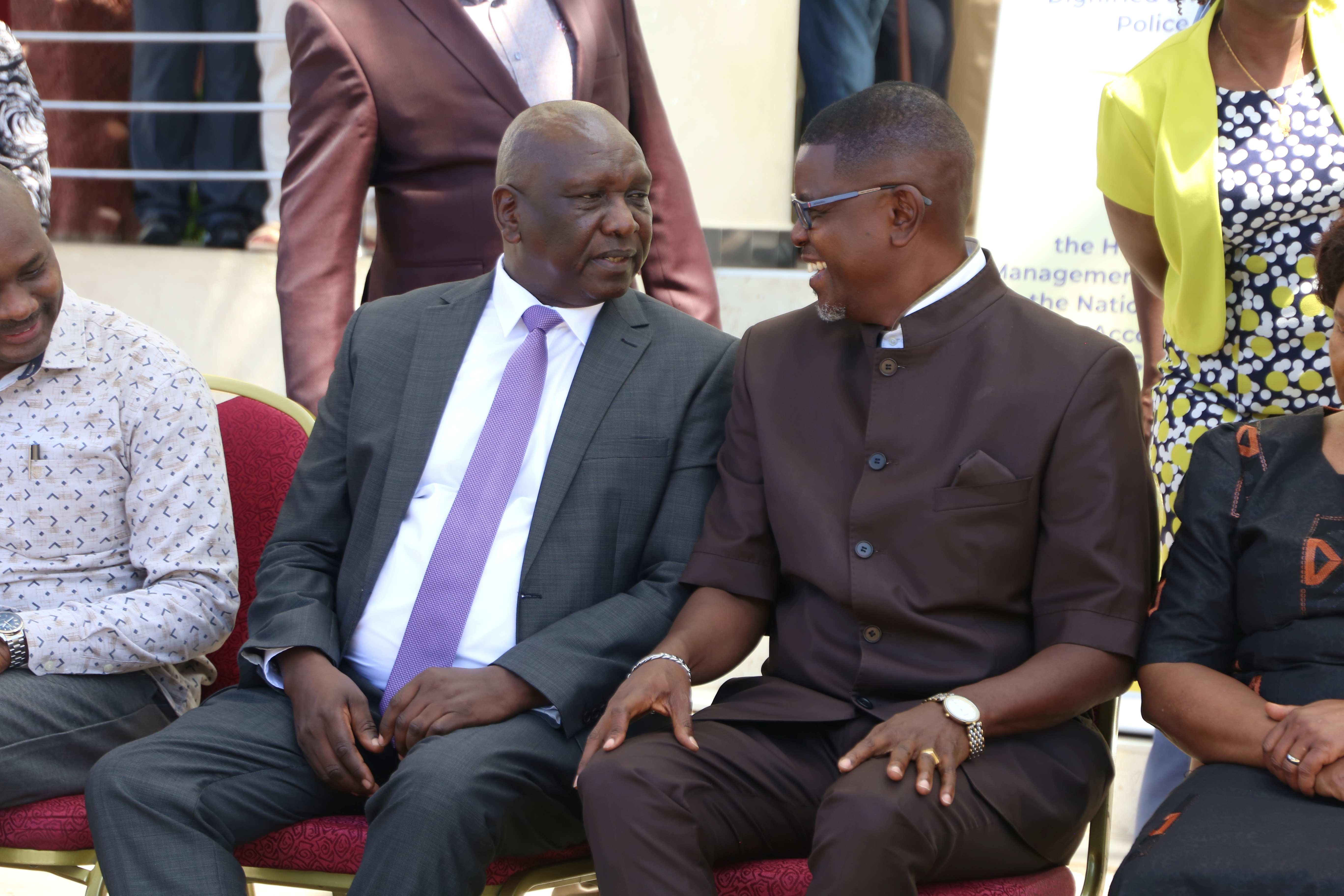
IG Douglas Kanja and NPSC chair Amani Komora at Kenya School of Government in Mombasa on Friday /JOHN CHESOLI
The National Police Service Commission and the
National Police Service have set aside their differences pledging to work
together for the benefit of Kenyans.
Speaking after a meeting that lasted more than
five hours in Mombasa, NPSC chairman Amani Komora and Inspector General of Police
Douglas Kanja committed to working together and resolve any
disputes amicably should they arise.
“We have agreed to chart out a new chapter in
terms of how we relate, with more collegiality and with more respect to the different
mandates that are bestowed on us as constitutional offices,” Komora said.
This comes after weeks of push and pull over the mandate
of the two entities, especially regarding the police officers payroll.
Komora said the commission cannot succeed without
the service and the service cannot succeed without the commission.
“We have agreed on a very clear, elaborate
framework of working together that you will see as we move on. There will be
more synergy and closer collaboration without parties pulling apart,” the commission
chairman said.
Komora, however, said they will discuss the issue of
payroll later, adding there was no time to discuss it on Friday.
“On matters payroll, we ask Kenyans that they give
us more time because there are many things that need discussions that we did
not discuss today. It is only the first day," he said.
“Kenyans should know that we will sit down and
iron out that issue in the spirit of one government approach. We are all
serving the same people and we believe there will no longer be the push and
pull that you have been seeing.”
This was the first meeting between the two
entities since President William Ruto reconstituted the commission.
Komora expressed optimism that going forward the commission
and the service will work together professionally.
“This is a clear demonstration of a new
opportunity to reorganise and reconfigure the relations that are supposed to
obtain between the commission and the service,” he said.
For a long time, the commission had been incomplete,
with two commissioners missing but that has been resolved with recent appointments.
The commission now includes chairman Komora, Inspector General of Police Douglas Kanja, Colleta Suda, Edwin Cheluget, Perris Muthoni, Benjamin Imai, Angeline Siparo, Deputy Inspector General of Police Eliud Lagat, DCI boss Mohamed Amin, Banis Silal and CEO Peter Lelei.
“With the commission now fully constituted, we are
confident in our ability and capacity to spearhead the far reaching reforms
that will entrench a professional, responsive and police-centric police
service,” the NPSC chairman said.
Komora said they had three main agendas, but the most
urgent one was the recruitment of an additional 10,000 police officers to
bolster the NPS.
He said although they have independent roles, they
still work together.
The commission is established under article 246 of
the Constitution with the mandate to recruit and appoint persons to hold office
in the NPS, determine promotions and transfers, and exercise disciplinary
control over the members of the service.
Article 245 on the other hand grants the IG the
mandate to exercise independent command over the NPS ensuring its operational
efficiency, discipline and overall effectiveness.
The chairman said the commission on Friday held a meeting to
deliberate on various human resource matters within the service, with priority
being the recruitment of the 10,000 additional police officers.
“We are well aware that the nation requires to be
secured and we have to progressively beef up our numbers within the NPS so that
we move towards the best international practices,” Komora said.
He said the upcoming recruitment exercise will be
guided by the 2025 regulations, which were developed pursuant to
section 28 of the NPSC Act to address the gaps identified in the earlier
regulations of 2015, while incorporating emerging issues in policing and human
resource management.
Komora said they will ensure transparency and merit-based
selection in the recruitment process.
“The commission also considered and approved a comprehensive
roadmap and instruments to facilitate the immediate commencement of the
recruitment exercise,” the NPSC chairman said at the Kenya School of Government in
Mombasa.
The roadmap outlines key steps from the advertisement
of the vacancies up to the final selection of successful candidates who will thereafter
report to various designated training colleges.
“The commission will therefore soon advertise the
vacancies as part of this structured recruitment process aimed at ensuring that
successful candidates report to the training colleges later in the year,”
Komora said.
Kanja welcomed the decision to recruit the 10,000
additional police constables.
“This initiative could not have come at a more
critical time when the service members are dwindling due to natural attrition
and other factors,” he said.
He said strengthening the human resource
capacity ensures that service remains adequately equipped to address the evolving
security needs of the nation.
“Together we will continue to build a NPS that is trusted by the people and respected for its professionalism, discipline and unwavering dedication to maintain law order and safeguard life and property,” Kanja said.
Instant Analysis:
There has been a dispute between the police commission and
the service over who has the constitutional authority to control the Sh60
billion police payroll. The payroll is a human resource function vital for the recruitment,
promotion and disciplinary actions. The NPSC claims payroll management is
integral to its mandate as the employer, while the IG’s office has maintained
control. The disagreement has led to a court petition and calls for mediation
by the Interior ministry.



![[PHOTOS] China holds massive parade to mark 80th anniversary of WWII](/_next/image?url=https%3A%2F%2Fcdn.radioafrica.digital%2Fimage%2F2025%2F09%2Fbd5dfa7a-3a06-486e-b6b0-6b032c0ffc73.jpg&w=3840&q=100)








